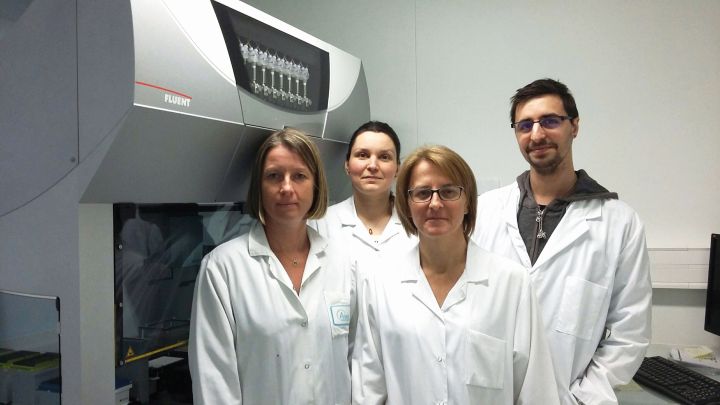Tecan uses cookies to improve our website. By continuing to browse our website, you accept our cookie policy.
Tecan uses cookies to improve our website. By continuing to browse our website, you accept our cookie policy.

Quality control of milk is important to ensure compliance with regulations and to support dairy farmers in their herd management. However, analyzing multiple milk samples from many individual cows is a time-consuming process. French laboratory AGRANIS is using a new, automated genotyping technique to analyze bulk tank milk samples, saving time and money on its testing services.
AGRANIS, based in Laval, specializes in milk analysis on behalf of dairy farmers, livestock consulting companies and vets. Founded in 2005, the company now employs around 30 people and is growing its services, as Genomic Manager Dr Florent Perrin explained: “We work mainly with milk samples, performing biochemical and microbiological analyses to determine, for example, protein or diuretic content, as well as carrying out ELISA tests and qPCR. We process around 4.5 million samples per year from across the country, and focus on two primary activities. Firstly, we assess the quality of milk from farmers according to industry regulations and, secondly, we support dairy farmers and livestock consulting companies to improve herd management by determining the somatic cell count (SCC) for each cow. The SCC is quantified as the number of cells per milliliter of milk, and is used as an indicator of quality, since a high SCC is typically the result of an increase in white blood cells in response to an infection. Generally, the SCC is determined by flow cytometry, requiring analysis of individual milk samples from each cow in a herd, which involves a large number of samples. However, prior genotyping of cartilage samples from each cow in a herd makes it possible to determine the SCC of each animal in a single bulk tank milk sample.”
“This patented approach – called Genocellules® (Groupe Seenergi) – is rather groundbreaking in agriculture, and relies on reliable DNA extraction from both milk and cartilage samples. This was not an activity we had done before, and so we decided to purchase a Fluent® Automation Workstation in October 2017 to help us achieve consistent results and cope with the number of samples we would be processing. We already had a Freedom EVO® 150 liquid handling workstation and two Sunrise™ absorbance microplate readers, and so it made sense to add a Fluent so that we could consolidate service and support. We had also had good reports about its reliability and reproducibility from other laboratories, which made us even more confident of our decision. The Tecan team installed the platform and provided training, allowing us to create our own programs.”

Members of the AGRANIS team with Dr Florent Perrin (right)
“Our workflow is separated into two parts – the first step is to extract DNA using a Nucleospin® Tissue 96 Kit from Macherey-Nagel. The two matrices present different challenges; the cartilage samples are processed in a non-standard tube format, and the milk contains high levels of protein and fat. To overcome these issues, we developed two separate protocols to handle each sample matrix appropriately, benefitting greatly from the Fluent’s precise pipetting, which allowed us to validate the protocols within two weeks of the system being installed. Following DNA extraction, genotyping is carried out on a Freedom EVO 150 liquid handling workstation using a BovineSNP50 v3 DNA Analysis BeadChip protocol from Illumina.”
“There were a number of experimental requirements that made the Fluent our platform of choice. We use a BioShake® 3000-T elm (Quantifoil Instruments) for shaking and homogenization of samples, as well as heating buffers up to 70 °C. We also have a Te- VacS™ module to perform filtration steps without needing an external centrifuge, and have developed a custom suction force profile to optimize the process. Automating the protocol would not have been possible without the Robotic Gripper Arm™, which moves the plates and allows the workflow to be performed without the need for manual intervention. This set-up has given us high DNA extraction yields, which are essential for genotyping. The entire extraction process – lysis of samples, binding, washing and elution – also needed to be carried out in such a way that we could carry out other procedures in parallel, which was straightforward thanks to the user-friendly TouchTools™ interface. It guides us through the worktable set-up step by step – where to place different elements, number of samples, etc. – helping to minimize the risk of errors.”
"Automating DNA extraction has saved us time, and the enhanced speed allows us to achieve reliable batch processing of 96 samples in just two hours, running several plates a day."
“Automating DNA extraction has saved us time, and the enhanced speed allows us to achieve reliable batch processing of 96 samples in just two hours, running several plates a day. Today, we can analyze around 1,300 samples a week, rapidly genotyping each cow of a herd, then determining individual SCCs from a bulk tank milk sample. This is a real benefit to our clients, as they only need to routinely supply us with bulk tank milk samples, and we can carry out twice as many analyses in the same amount of time. I’m happy to say that the two protocols are running perfectly and, to date, we have not encountered any problems. We are very pleased with the Fluent’s performance, and are already considering how we can develop and program new protocols to support future projects.”
To find out more about Tecan’s nucleic acid purification solutions, visit www.tecan.com/NAP
To learn more about AGRANIS, go to www.seenergi.fr/en